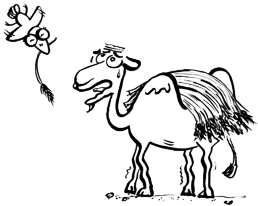This article repeated the myth, which I've discussed ad nauseum before, that therapy will *fix* kids who present chronic conflict.
Okay, I make a large part of my income as a therapist so it's pretty safe to assume that I believe that therapy works for some people in some situations. What I don't believe is that therapy will *fix* our kids. I do believe that permanent, stable, committed parenting will help most of our kids reach a safe and positive adulthood - but I don't believe it will do diddly squat during the growing up years. I do believe that supporting the parents, providing them with respite, and providing them with effective conflict management skills will get the family to the finish line in one piece and with relationships intact or at least reparable.
However, because of the myth of the magic answer, I observe that while the good intentioned parents are dragging Junior from one therapist to another, nothing changes in the family, but something gets noticed by Junior -- and that is that everyone is seeking the magic answer that will fix his world. This process creates kids and youths who are professional clients - they view themselves as belonging on the caseload of someone who will save or fix them, because they have spent their pre-adoption years being monitored by child protection and then adoption workers, and then their post adoption years are spent learning how to behave in a therapist's office. Junior becomes trapped by the notion that there is a magic answer somewhere out in the universe that will make everything better - and so she moves into adulthood with this outlandish belief and she is stuck blaming everyone else for the ongoing problems. Really, what else could you expect a child or youth to believe if that is what the parents are taught to believe by the adoption industry?
But, it must seem like a trick to the young adults, because once they hit the age of majority, society no longer views them as victims of their early years, instead, they are viewed as failures or worse. They have transitioned through each life stage seeing therapists who specialize in working with children, to therapists who work with teens, to therapists who work with adults who continue to struggle with drugs and alcohol, or who struggle with parenting, or who live below the poverty line. They have become professional clients - they view themselves as passive recipients of other people's efforts to get them *fixed*.
Well, this is one of those few areas I do have ideas for changing this, and again, I've written about this before. We need to stop buying into the myth of the of magic solution and start buying into the reality of supporting parents. We need to accept our kids for who they are in the moment - angry, hurting, confused, unpleasant, sometimes threatening, drug abusing, rude, addicted to social media - and we need to use skills to manage the conflict and the anger they create.We need to role model our understanding that there are no magic answers or right therapies that will replace time, commitment, stability, and emotionally regulated parents who can go the distance with the kids. Its possible.
Hey, enjoy your day - and know that you are entitled to a better one!! 







